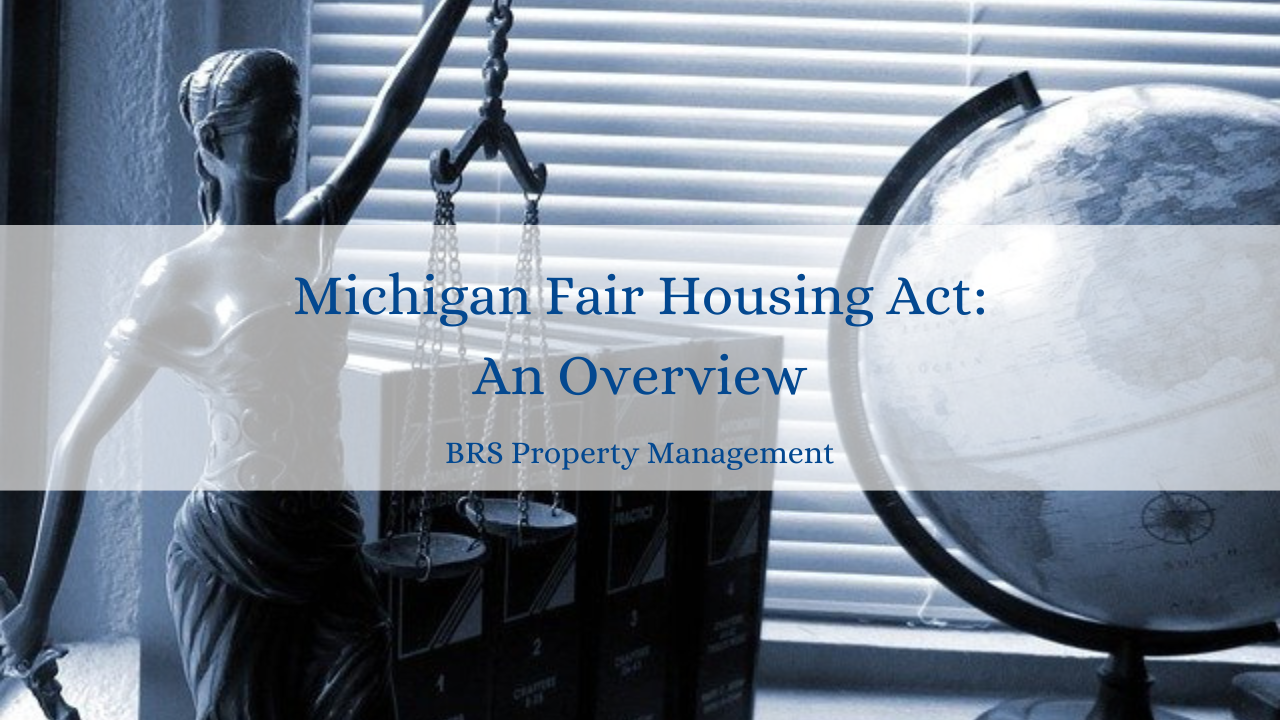Investing in real estate can be a highly profitable venture. Rental properties, for instance, have a great potential for long-term appreciation while also providing a stable source of passive income. However, managing a rental is no easy feat!
Rental property owners have many responsibilities, including property maintenance and repairs, rent collection, administrative work, and financial reporting. Landlords must also comply with many local rental laws, including security deposit laws, eviction laws and the Fair Housing Act.
Failing to comply with fair housing laws can lead to serious legal problems, including costly fines and long-drawn lawsuits. In this guide, the experts at BRS Property Management will go over everything you should know about the Fair Housing Act in Michigan.
Keep reading to learn how to comply with these regulations when renting out a property in the Metro Detroit Area!
What Is the Fair Housing Act?
The Fair Housing Act is a federal law that forbids discrimination in housing. Enacted by Congress in 1968, its main goal is to ensure everyone is treated equally when renting or buying a property.
Per the Fair Housing Act, landlords, real estate agents, and sellers are prohibited from discriminating against tenants or buyers based on race, religion, sex, national origin, disability, and family status. But, what exactly does this mean?

This means that, as a landlord, you cannot refuse to rent your property to someone just because they have children or because they are of a certain race or religion.
The Fair Housing Act requires that you make any necessary accommodations for tenants with disabilities, such as allowing service animals on the property and providing accessible features.
What Is the Fair Housing Act Like in Michigan?
The U.S. Department of Housing and Urban Development is in charge of enforcing the Federal Fair Housing Act (HUD).
It prohibits discrimination based on six protected classes: race, national origin, religion, sex, familial status, and disability. In addition to abiding by these federal housing laws, you also might have to follow state fair housing laws.
In Michigan, housing discrimination is also prohibited by the Elliott-Larsen Civil Rights Act and the Persons with Disabilities Civil Rights Act. State laws include all federally protected classes, in addition to the following ones:
Age: This protection prevents landlords from refusing to rent or negotiate with someone solely because of their age. Age discrimination can manifest in various ways, such as setting arbitrary age limits for renters or offering different terms and conditions to individuals based on their age.

Marital Status: Michigan’s fair housing laws ensure that individuals or couples are not denied housing due to their relationship status. This protection is crucial for unmarried couples, single individuals, and those who are divorced or widowed, who might otherwise face bias from landlords or sellers.
Sexual Orientation: The Fair Housing Act in Michigan explicitly protects individuals from discrimination based on their sexual orientation. This means that no matter how someone identifies, they are entitled to the same housing opportunities as anyone else.
Gender Identity or Expression: Fair housing laws guarantee that everyone has equal housing rights. This includes transgender and gender non-conforming individuals. Discrimination against this protected class can include refusal to rent, differential treatment, or even harassment based on a person’s gender identity or the way they express their gender.
How to Comply with the Fair Housing Act
Failing to comply with the Fair Housing Act can lead to serious legal consequences and tarnish your reputation as a landlord. If you’re not sure whether you’re abiding by the laws, we’ve got you covered!
Here are some best practices to ensure you comply with local and federal housing laws when renting a property in Michigan:
Educate Yourself: By understanding the Fair Housing Act, you’ll be less likely to discriminate against tenants based on protected characteristics unintentionally.

Set Consistent Policies: Setting standard policies and terms for all your leases will ensure you treat all tenants equally.
Inclusive Advertising: Abstain from using discriminatory language in your marketing materials. This can include phrases that suggest a preference for or against certain groups or outright saying “No [protected class] allowed.”
Set Fair Rental Rates: As a landlord, you cannot increase or decrease the price of your unit to appeal or determine to a certain class from renting your property. Instead, you must ensure that the pricing remains consistent for all tenants.
Provide Suitable Accommodations: If you rent your property to a disabled individual, you must make reasonable accommodations. This includes allowing service animals and installing ramps or other accessibility features on the property.
Screen Tenants: Ensure your tenant screening process complies with Fair Housing Laws. Select tenants based on non-discriminatory criteria such as rental history, credit score, and employment status.
Document Everything: Keep detailed records of tenant interactions, application forms, and screening reports. This will help you demonstrate your compliance with fair housing laws in case a complaint ever arises.
Maintain the Property: You must continue to comply with fair housing laws even after renting out your unit. This includes providing timely repairs and maintenance services for all tenants, regardless of their race, religion, marital status, sexual orientation, or any other protected characteristics.
Bottom Line
The goal of the Fair Housing Act is to provide both renters and buyers equal chances of finding appropriate housing. Failing to comply with fair housing laws can have serious legal consequences.
So, if you’re thinking about renting out a property in the Metro Detroit area, you should familiarize yourself with the Michigan Fair Housing Act.
In this article, we’ve gone over the Fair Housing Act on both the federal and local levels. Now you understand all the protected classes and know that by treating all applicants fairly, using inclusive advertising, and setting consistent policies, you’ll be able to comply with fair housing laws effortlessly.
If you have any more questions about the Fair Housing Act in Michigan, contact BRS Property Management. Our team will be happy to help you!
Disclaimer: Please note that the information provided in this blog is intended for general guidance and should not be considered as a replacement for professional legal advice. It is important to be aware that laws pertaining to property management may change, rendering this information outdated by the time you read it.


